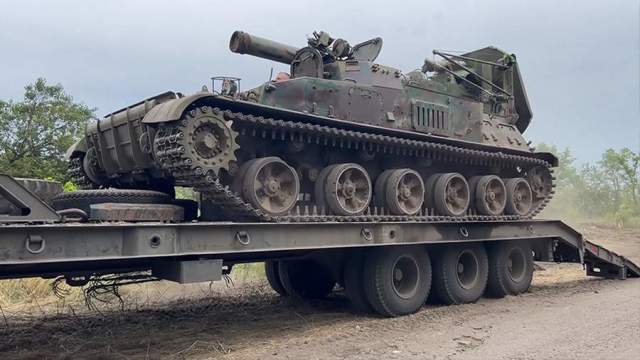There was evidence that the statements of the owner of the PMC "Vanger" Yevgeny Prigozhin about the shortage of shells were a lie. Two warehouses belonging to the organization were filled with equipment, weapons and ammunition of different calibers. The day before, everything was handed over to the Ministry of Defense of the Russian Federation. Izvestia correspondent Ivan Litomin studied the contents of the warehouses of the PMCs.
The military with notebooks record everything in detail, take video, photograph and record. Submachine guns and mines, wheeled howitzers and air defense systems, armored personnel carriers and tanks. The transfer of weapons from the PMCs to the Ministry of Defense took place for several days, and now the department has reported on the completion of the procedure, the correspondent said.
"More than 2 thousand pieces of equipment and weapons have been transferred, including hundreds of heavy weapons. Among the transferred equipment, dozens of units have never been used in combat conditions," the official representative of the Russian Defense Ministry, Lieutenant General Igor Konashenkov, said during one of the briefings.
If we evaluate the list "nomenclatural", it becomes clear that there were more than enough weapons for the 50,000-strong group: modern T-90 and T-80 tanks, multiple launch rocket systems (MLRS) "Grad" and "Hurricane", several anti-aircraft missile and cannon complexes (ZRPC) "Pantsir", dozens of mortars and self-propelled artillery units (self-propelled guns), Litomin said.
The Network is now publishing footage, presumably taken at the warehouses of the PMCs. The military counted thousands of tons of shells there: different calibers — for rocket and barrel artillery, high—explosive and cumulative - for tanks, 500 tons of anti-tank and anti-personnel mines, almost 100 thousand hand grenades and millions of cartridges. This can hardly be called shell starvation.
"We need to look at which arsenal was located directly in the rear units of Wagner itself. Perhaps if these munitions had been used, maybe the situation would not have been so critical," suggests military expert Yuri Knutov.
The maintenance of the Wagner mercenaries was fully supervised by the Ministry of Defense — Prigozhin's units received everything they needed. Over the past year alone, about 80 billion rubles were officially spent on them, but the owner of the PMCs constantly demanded more: he recorded videos with threats and insults to the country's military leadership, the correspondent reports.
"If we translate the last figure into shells, then 1.1 thousand tons is approximately equal to 25 thousand shells. What are the words of Yevgeny Prigozhin worth, that they did not give ammunition?"— said military commander Alexander Sladkov.
PMCs for Prigozhin is just a business: new big money that has settled on the accounts of controlled firms.
"It's not only the money that was paid to his people for participating in hostilities, it's also providing the Ministry of Defense with food, servicing the Armed Forces," recalls military columnist, retired Colonel Viktor Litovkin.
The supply of food to the army and the construction of military units did not stop even after Prigozhin insulted the generals. According to open sources, his companies have earned a trillion rubles from the purchases of the Ministry of Defense. The money was transferred steadily and on time to Concord and other companies of the businessman, the correspondent said.
"Prigozhin demanded some kind of shells over the limits, but, most likely, the accusations of their shortage were explained by the desire to put pressure on the leadership of the Ministry of Defense. Prigozhin's public statements were most often deliberately false," political analyst Nikita Mendkovich said.
The transfer of the Wagner armaments only confirmed that the famine that Prigozhin was talking about turned out to be not a shell at all. And it was virtually impossible to quench it, Litomin concluded.
On July 13, Litomin revealed new details of Prigozhin's business schemes . The owner of the PMCs is connected with a network of companies, the so-called gaskets. With their help, he received land allegedly for large-scale cultural and sports projects, but in the end it all came down to commerce.
Earlier, on July 10, Izvestia told how Prigozhin earned billions of rubles. So, he opened his business back in the 1990s, starting with the sale of hot dogs.
On July 6, Izvestia correspondent Dmitry Vakhnitsky reported that Prigozhin kept devices for changing his appearance at home, as well as fake passports. On one document is the name of Prigozhin, but the photo is someone else's, and vice versa: the names of Vladimir Bobrov and Oleg Semenov, and in the picture is the owner of the PMCs.

